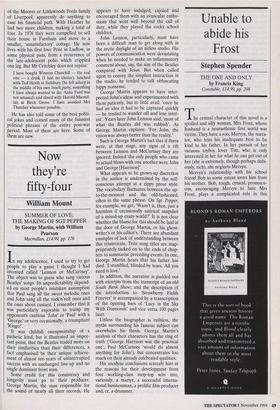Now they're fifty-four
William Mount
SUMMER OF LOVE: THE MAKING OF SGT PEPPER by George Martin, with William Pearson Macmillan, £14.99, pp. 176
BMW
In my adolescence, I used to try to get people to play a game I thought I had invented called 'Lennon or McCartney'. The object was to guess who sang various Beatles' songs. Its unpredictability depend- ed on most people's mistaken assumption that Paul sang all the sweet melodic ones and John sang all the rock'n'roll ones and the ones about custard. I remember that it was particularly enjoyable to trump my Opponent's cautious 'John' or 'Paul' with a `George' or very occasionally, a triumphant `Ringo!'.
It was childish oneupmanship of a pathetic kind, but it illustrated an impor- tant point, that the Beatles traded more on their similarities than their differences, a fact emphasised by their unique achieve- ment of almost ten years of uninterrupted success with an unchanged line-up and no single dominant front man.
Some credit for this consistency and longevity must go to their producer, George Martin, the man responsible for the sound of nearly all their records. He appears to have indulged, cajoled and encouraged them with an avuncular enthu- siasm that went well beyond the call of duty, while they played the cocky school children.
John Lennon, particularly, must have been a difficult man to get along with in the arctic daylight of an airless studio. His powers of communication were devastating when he needed to make an inflammatory comment about, say, the size of the Beatles compared with Jesus. But when called upon to convey the simplest instruction in the studio, he tended to talk obfuscating hippy nonsense. George Martin appears to have inter- preted John's ideas and experimented with them patiently, but to little avail: 'once he had an idea it had to be captured quickly — he tended to wander off and lose inter- est'. Years later John Lennon said, 'most of what the Beatles did was rubbish'. As George Martin explains: 'For John, the vision was always better than the reality.'
Such is George Martin's tact that if there were, at that stage, any signs of a rift between Lennon and McCartney they are ignored. Indeed 'the only people who came to actual blows with one another were John and George [Harrison]'.
What appears to be grown-up discretion in the author is undermined by the self- conscious attempt at a zippy prose style. The vocabulary fluctuates between the up- to-the-moment and the old-fashioned, often in the same phrase. On Sgt. Pepper, for example, we get, 'Wasn't it, then, just a harmless if occasionally satirical snapshot of a mixed-up crazy world?' It is not clear whether the blame for this should be laid at the door of George Martin, or his ghost- writer's or his editor's. There are abundant examples of lack of understanding between this triumvirate. Trite song titles are inap- propriately tacked on to the ends of chap- ters to summarise preceding events. In one, George Martin hears that his father has died. 'I stumbled, blinded by tears. All you need is love.'
In addition, the narrative is padded out with excerpts from the transcript of an old South Bank Show; and the description of the introduction to 'Strawberry Fields Forever' is accompanied by a transcription of the opening bars of 'Lucy in the Sky With Diamonds' and vice versa 100 pages later.
Unless the biographer is ruthless, the myths surrounding his famous subject can overwhelm his thesis. George Martin's analysis of their characters has the ring of truth (`George Harrison was the practical one', Paul McCartney 'would do almost anything for John'), but concentrates too much on their already celebrated qualities.
His anodyne conclusions scarcely hint at the reasons for their development from four working-class mop-top wits into, variously, a martyr, a successful interna- tional businessman, a prolific film producer and, er, a drummer.










































































 Previous page
Previous page